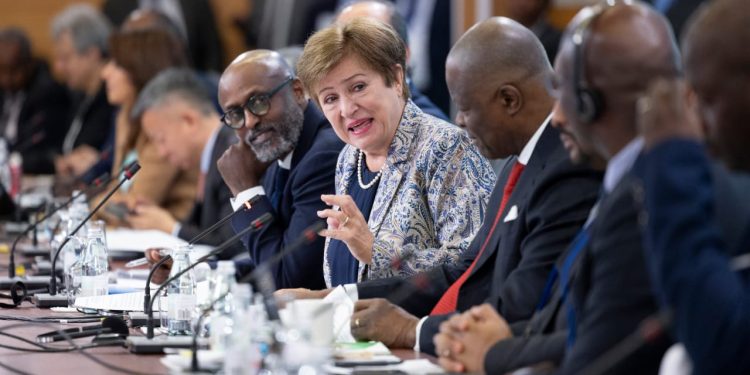- IMF and African Caucus Reaffirm Commitment to Growth Amid Tight Financing and Climate Pressures
Africa’s voice rang with both resolve and realism at the 2025 IMF–World Bank Annual Meetings in Washington, D.C. As global growth cools and financing conditions tighten, the African Caucus, representing the continent’s finance ministers and central bank governors, met with IMF Managing Director Kristalina Georgieva to chart a course for stability and inclusive growth across a region once again navigating complex global shifts.
At the heart of the joint communiqué was a sober recognition: while the global economy faces mounting headwinds, from rising protectionism to geopolitical fragmentation, Africa’s growth remains comparatively strong, projected at 4.2% for 2025, the same pace as last year. Debt levels have plateaued around 65% of GDP, and inflation is cooling toward 4%, offering tentative hope of macroeconomic normalisation.
“Despite this difficult global context, Africa’s growth remains resilient,” said Hervé Ndoba, Central African Republic Finance Minister and Chair of the African Caucus. “But vulnerabilities remain significant, particularly for low-income and fragile states.”
The ministers acknowledged that the continent’s resilience masks uneven progress. In low-income countries (LICs), interest payments now consume roughly 15% of revenues, constraining fiscal flexibility and development spending. With official aid declining and borrowing costs high, many African economies are caught between debt servicing pressures and the need to fund social priorities like education, energy, and healthcare.
For countries like Ghana, Zambia, and Ethiopia, which have recently restructured their debts under IMF programs, maintaining fiscal discipline while protecting growth remains a delicate balancing act. Ghana, for instance, is targeting single-digit inflation and renewed private sector confidence following its debt restructuring and Extended Credit Facility (ECF) program.
The Caucus reaffirmed its collective push for domestic resource mobilisation, through digital tax systems, fiscal transparency, and governance reforms, as a path to reducing reliance on external aid. The IMF, for its part, pledged to continue technical assistance and concessional financing through the Poverty Reduction and Growth Trust (PRGT) and the Resilience and Sustainability Trust (RST).
“Strengthening domestic revenue collection and improving spending efficiency are key to freeing up fiscal space for growth and resilience,” Georgieva emphasised, underscoring that nearly half of all RST programs approved so far are in Africa.
African ministers signalled intent to balance fiscal consolidation with targeted investments in human capital, infrastructure, and technology. The medium-term vision is to shift from consumption-led recovery to productivity-led expansion, supported by private sector growth and intra-African trade under the AfCFTA framework.
However, limited access to affordable capital continues to impede progress. African countries pay risk premiums well above global averages, often unrelated to fundamentals. Calls for reform of the global financial architecture, including a fairer approach to credit ratings, debt sustainability analysis, and access to Special Drawing Rights (SDRs), were renewed at the meeting.
“Africa cannot be resilient on rhetoric alone. The system must evolve to reflect our realities,” one senior African governor remarked privately, echoing a broader frustration among delegates that post-pandemic reforms have yet to translate into lower financing costs.
Another major theme was climate resilience. The IMF estimates that extreme weather events reduce output by 1–2 percentage points annually in vulnerable economies. Ministers called for scaled-up international support for adaptation financing, particularly for Sahelian and coastal nations facing recurring droughts, floods, and food insecurity.
Fragile and conflict-affected states, including Sudan and parts of the Great Lakes region, continue to experience humanitarian crises that undermine economic recovery. The Caucus emphasised the need for integrated approaches that link fiscal policy with security and climate action, rather than treating them as separate silos.
For resource-dependent economies, diversification remains essential. As commodity prices soften, the risk of renewed fiscal slippages looms large. The IMF urged countries to invest in value addition, energy transition, and green industrial policies to sustain long-term competitiveness.
For many African economies, including Ghana, Kenya, and Côte d’Ivoire, the current moment offers a paradox: external conditions are tightening, but domestic policy credibility is strengthening. The IMF’s renewed engagement through the PRGT and RST frameworks signals a recognition that Africa’s growth story is pivotal to global recovery.
“The Fund is strongly committed to its African members,” Georgieva concluded. “We are working with these nations to build fiscal space for scaled-up infrastructure and human capital spending, strengthen institutions, and accelerate progress toward the region’s legitimate development aspirations.”
The tone from the Caucus was one of cautious optimism. Africa’s fundamentals, its young population, digital innovation, and emerging regional value chains, remain intact. Yet, as ministers and IMF officials agreed, resilience must now give way to transformation: one built on reforms, inclusion, and credible partnerships that move beyond rhetoric toward results.
We at NorvanReports believe that as Africa navigates 2025 with cautious optimism, the continent’s challenge lies in translating resilience into renewal. If the IMF’s reaffirmed commitment is supported by flexible instruments and genuine reform of global financing norms, it could signal a significant shift. For Ghana and its peers, the message is clear: stability is no longer enough. It’s time to convert discipline into dynamism and resilience into real transformation.








